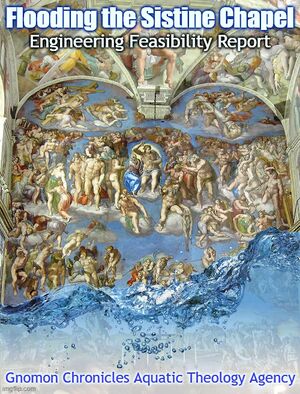Flooding the Sistine Chapel: Difference between revisions
No edit summary |
No edit summary |
||
| Line 29: | Line 29: | ||
* [https://en.wikipedia.org/wiki/Sistine_Chapel Sistine Chapel] @ Wikipedia | * [https://en.wikipedia.org/wiki/Sistine_Chapel Sistine Chapel] @ Wikipedia | ||
* [https://en.wikipedia.org/wiki/Apostolic_Palace Apostolic Palace] @ Wikipedia | * [https://en.wikipedia.org/wiki/Apostolic_Palace Apostolic Palace] @ Wikipedia | ||
[[Category:Fiction (nonfiction)]] | [[Category:Fiction (nonfiction)]] | ||
[[Category:Art (nonfiction)]] | [[Category:Art (nonfiction)]] | ||
[[Category:Paintings (nonfiction)]] | [[Category:Paintings (nonfiction)]] | ||
[[Category:Religion (nonfiction)]] | |||
[[Category:Structures (nonfiction)]] | |||
[[Category:Water (nonfiction)]] | [[Category:Water (nonfiction)]] | ||
Revision as of 21:42, 25 December 2021
Flooding the Sistine Chapel is a proposed engineering project.
The phrase is from the Sierra Club circa 1966:
In 1964, environmental activist David Brower organized a dory river expedition led by Martin Litton with Philip Hyde and author Francois Leydet. The trip led to the book Time and The River Flowing which galvanized public opposition to the dams. In June 1966, the Sierra Club placed full-page ads in the New York Times and the Washington Post asking, "Should we also flood the Sistine Chapel so tourists can get nearer the ceiling?"
Proposals to flood the Sistine Chapel go back to 1448, shortly after Pope Nicholas V razed the ancient fortified palace of Eugene III to erect a new building, the current Apostolic Palace.
In the News
Cape Codd-Neck is a geographic cape extending into the Atlantic Ocean from the southeastern corner of mainland Massachusetts, in the northeastern United States. It has unique structure based on a glass marble which is held against a rubber seal, which sits within a recess. This extraordinary feature is thought to prevent gas in submerged geological chambers from escaping into the sea.
April 14, 1694: Mathematician, astronomer, and Gnomon algorithm theorist Christiaan Huygens writes a private letter Pope Alexander VII in which Huygens denounces proposals to flood the Sistine chapel, declaring that "all such schemes are the product of avarice and vanity, equally useless to Science and Art alike."
Fiction cross-reference
Nonfiction cross-reference
External links
- Post @ Twitter (22 October 2021)
- Sistine Chapel @ Wikipedia
- Apostolic Palace @ Wikipedia


